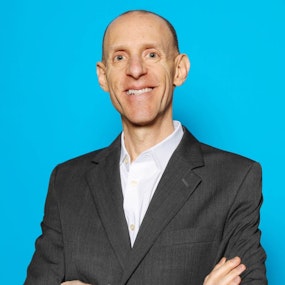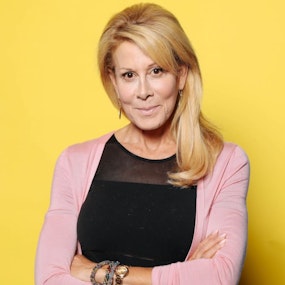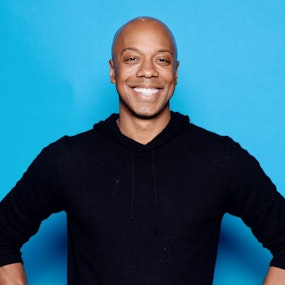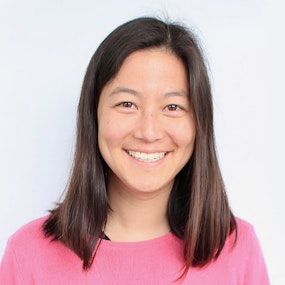#105 Teffola: Granola Guy Approved
A few years ago, Claire Smith moved back to her family farm, where they practice sustainable farming, and created Teffola. It’s granola made with an ancient Ethiopian grain called teff, which is filled with lots of protein, f...
A few years ago, Claire Smith moved back to her family farm, where they practice sustainable farming, and created Teffola. It’s granola made with an ancient Ethiopian grain called teff, which is filled with lots of protein, fiber, iron, and calcium. The only problem is… no one’s heard of it. Is it too risky to invest in a business that needs to educate consumers on a rare ancient grain and on sustainable farming practices?
To try the 'Granola Guy Approved' snack yourself, visit pitch.show/granola
Like the podcast? Use this link to share with friends!
Charles: And action [clap]
Josh: But what pitch is it?
Charles: Pitch #4
Oat milk. Kale. Chia seeds. Matcha. Acai… for a while, nobody was talking about these ingredients. Then, in an INSTANT, they were in everybody’s fridge. Not because they were new, necessarily. But because they were trends fueled by really good marketing.
Claire Smith wants to do the same thing with an ancient Ethiopian grain called Teff. If you’ve never heard of it, you’re not alone. But this founder aims to change that. [end]
Can this one woman show convince investors that Teff is the new quinoa? Or is it just too teffy to tango?
I’m Josh Muccio. Welcome to The Pitch! Where real entrepreneurs pitch real investors for real money.
Neal Sales-Griffin: I’m Neal Sales-Griffin, Managing Director here at Techstars Chicago, and I’m happy to welcome y'all to my city
Elizabeth Yin: I’m Elizabeth Yin, and I’m a General Partner at Hustle Fund
Charles Hudson: I’m Charles Hudson, Managing Partner, Precursor Ventures
Phil Nadel: I’m Phil Nadel, I’m the Managing Director of Forefront Venture Partners
Jillian Manus: I’m Jillian Manus, Managing Partner of Structure Capital
The Pitch for Teffola is coming up after this.
[break]
The information provided on this show is not intended to be investment advice and should not be relied upon as such. The investors on today’s episode are providing their opinions based on their own assessment of the business presented. Those opinions should not be considered professional investment advice.
Phil: There she is.
[hellos]
Charles: Hey, nice to meet you.
Claire: Good morning. My name is Claire Smith, and I am the founder of Teffola. We're all supposed to eat healthier food, right? I mean, how many times have you told your kids or your spouse, try this, it's good for you? Well, you're not alone. The naturally healthy foods market reached 279 billion dollars last year, and there's a new market emerging. Sustainable goods hit 150 billion with a growth rate two and a half times that of traditional goods. Consumer mindset and their spending is shifting from just good for me, to good for me and good for the planet. But let's take a bit of a step back. I grew up as the seventh generation on a farm in Michigan where we've been practicing regenerative techniques focusing on soil health for decades. But in 2015, my dad started to see these wildly fluctuating prices for the commodity crops that we'd been growing. So he began to raise alternative gluten-free grains like teff and buckwheat. And so we're pivoting from corn and soy, which have been the backbone of our farm for a long time, to these different grains. Now, I was living in Western Canada when my mom and dad pitched me this idea to come back to the farm and start something - and I mean anything - with these grains. Eventually, we came up with Teffola, a boldly flavored granola celebrating these ancient grains grown on the farm. Now we're expanding into the snack category, projected to outperform granola revenue two to one by the end of next year. We've done the dirty and scrappy work to know that we're on to something big. And now we're raising 375,000 dollars for the next stage of growth. Thank you.
Elizabeth: Can we try it?
Claire: Yes. So here are the bites. We have triple chocolate, almond butter mocha -
Elizabeth: Thank you.
Jillian: So we're being - and so do all of these have sugar in them?
Claire: So they're just sweetened with just dates and then the granola itself has maple syrup in it.
Charles: Thank you so much.
Claire: And that's our only sweetener.
Jillian: Can you tell a little bit more about the different properties of teff? I've never heard of it before.
Claire: So teff is originally from Ethiopia, so lots of protein, fiber, iron and calcium. My favorite fun fact about teff is that Ethiopian women don't struggle with anemia during pregnancy because there's so much iron in it.
Phil: Jillian's initial question raises a point, which is I know most people haven't tried teff and aren't familiar with it. Are you concerned that most consumers not being familiar with teff, will have a hard time getting comfortable buying a product called Teffola, when there are lots of gluten-free granola alternatives available?
Claire: Mhm so what we found, I…I did more than 100 demos in the year of 2019, plus a lot of farmers markets. And so when I was educating people about what teff was and the product, they were very interested in the farm and the story and the grain, but as time went on, I realized they're not buying the granola because of the teff itself they're buying it because of the flavor, texture and nutrition, and then the farm story and what we're doing, and then, like, oh it's also a cool grain. But what was really clear to me and what I possibly wish I had done a little bit differently before naming it Teffola, was I didn't want to build a company around one ingredient, because, you know, you see interest spike for that one ingredient and then it kind of peters away. Like, if you think of goji berries or chia seeds, those insane spikes of interest and now, no one's using goji berries. And like so if I built my company around one ingredient, I wouldn't be comfortable with that. So we're building an ancient grains company, specifically gluten free, so -
Phil: Does that mean you'll have products with other names other than Teffola?
Claire: Yep. We have the Teffola and Teffola bites right now. These go into production in January. And then also next year, we're looking at our first savory product. It'll be like a salad topper, so chickpeas, pumpkin seeds, buckwheat, teff in a spiced mixture. That will be launched under our parent company name, which is Tenera Grains Products. And just to be clear, the farm and my company are separate. We're kind of like a spin off
Elizabeth: Can you talk about your unit economics?
Claire: So our blended margin is 27% between direct to consumer, which is online and Amazon, and then our wholesale and distributor channels. And then our COGs per bag are about 4.35.
Phil: What's your total current revenue? And percentage is from direct to consumer versus third party retail?
Claire: Year to date, we're at 70,000 with 10,000 in accounts receivable. So 40% to distributor, 30% direct to stores, and then direct to consumer is right around 30%.
Elizabeth: What stores are you in right now?
Claire: So we are in a couple of Fresh Thyme stores, we're in more specialty independent stores. Some of our larger accounts would be Better Health in southeastern Michigan, Busch's, those have 15, 16 locations each. We do really well in the independent specialty grocery stores, which is why we brought on KeHE, who’s a national distributor. So we're in two of their warehouses in the Midwest. And Covid taught me a lot of things, but 80% of my business was wholesale. And then that tanked. And so we just needed to kind of even out our channels and be a bit more deliberate about who we're partnering with.
Neal: At the consumer level, what have you learned about, you know, why people are hiring Teffola as opposed to other products?
Claire: Flavor. We have a really complex flavor profile. It's not an oat based granola. You're looking at almonds, walnuts, buckwheat. Yes, there are oats, teff - it's just, I don't like one-note kind of products. Plus, there's more of this focus of the regenerative agriculture. I get to educate people about what that really means.
The investors are really getting into the nuts and seeds of this pitch. Starting with regenerative agriculture. Which, if you don’t know, is sustainable farming focused on long term soil health.
This sustainability angle is crucial to Claire’s pitch for Teffola, and to drive home the point, she brought two jars of soil into The Pitch Room.
Claire: One is dead potting soil - I'm calling it dead, because it's been sitting on my patio for three years with nothing in it. And then the larger jar is dirty that I got from the farm, and there's worms in there, there’s a whole microcosm of organisms that keep the soil healthy and replenish nutrients that the different grains need. So we are highlighting, like, all of our ingredients, we want to source with those regenerative practices, because it's better for the planet.
Phil: Can you just talk a little bit about what products you see as your primary competition and how you're differentiating?
Claire: In the granola space, it would be Purely Elizabeth. So she has a clean ingredient label. Some of her products are gluten free or grain free. In the snack bites, our competitor would be Made Good. And they have a huge - I'm not sure if you're familiar with Made Good -
Phil: Yes.
Claire: - but they have a really - a bigger line up. And I would say they have a good ingredient label, but I don't see brands really committing to this regenerative agriculture, which is different than organic.
Phil: Doesn't your ideal customer, in addition to regenerative farming practices, don't you think that they also want to see organic products?
Claire: I think customers are learning the difference between organic and regenerative. You can be an organic farmer and plant the same crops year after year after year and that is stripping the soil. Just because you're organic, doesn't mean you're focused on soil health. We would be organic if we could make sure that our entire supply chain was practicing regenerative techniques and not all organic farmers can say that. So first and foremost to me is regenerative techniques, and all of our ingredients are non-GMO. But our ideal customer wants to see that we care about our product. And so since there isn't a regenerative ag certification, it's talking to consumers about that, educating them on the website, working with our packaging. That's how we would communicate that.
Phil: So is that your differentiation, that focus on regenerative agriculture? So if -
Elizabeth: How do you market that?
Phil: Yeah. I mean, I was gonna say, your packaging doesn't really -
Jillian: Has nothing on it.
Elizabeth: It doesn't yell that.
Phil: A little bit on the back. But the front of the package doesn't really reflect that that's your focus. when you're competing on the shelf, against lots of different brands and they're looking not so much at the back of the package but at the front, you should be shouting regenerative agriculture, ancient grains. And also, look at the tiny gluten free -
Jillian: I know!
Phil: - that should be more - you know.
Jillian: I mean, on the top, I would put ancient Ethiopian grain. And I'd be like Ooh!
Claire: So we have Michigan-grown teff right on the front. It's in the center of the package.
Jillian: But that's not -
Elizabeth: I think it's too small. I very much think about marketing first. And in this space, you know, the branding and how that comes across is really, really important. I would actually do a full rebrand because these are your selling points, and you need to be able to capture that attention in two seconds. Not in 20 seconds - two seconds.
Neal: So there's our opinions up here. But I'm curious to know, have you spent time with the people who have actually purchased your product to understand what’s drawing them in? Is it what we're talking about? Or is it something else?
Claire: So they're drawn in by the low sugar. So we're three or four grams per sugar - of sugar per serving.
Jillian: Absolutely. Nothing here.
Claire: So it's on the front, it's just not big enough.
Phil: Then that should be -
Jillian: That right there.
Jillian: So this teeny weeny little thing?
Neal: I got it.
Jillian: Okay. You're talking about less sugar, healthy soil, ancient Ethiopian grains - like, if you had that all here, I'd be like, ooh, okay. Now you've got me. Now this is fascinating. You have it. You're not showing it.
Claire’s got it. But her packaging, does not. Can she dig herself out of this one?
That’s coming up, after a snack sized ad break.
[break]
Welcome back to The Pitch Room! Claire Smith is pitching her teff based snack bites and granola. The investors don’t love the packaging, but they’re intrigued by the product. And if Claire can show a solid plan to get her product into more peoples’ hands, that could turnaround this pitch. Here’s Phil.
Phil: To me, this product just lends itself so well to direct to consumer, and you mentioned that during Covid you realized that you needed to diversify your distribution channels and start moving more to direct to consumer. Have you seen more traction there than via retail?
Claire: Yeah. I think the direct to consumer has been better for us. We entered into a Google study where they are paying for, you know, $30,000 worth of ads and running the campaigns, and that massive amount of traffic to the website we've seen, you know, 3% conversion rates and that's been very eye-opening for me, because I never had the money beforehand to do any sort of digital ad. And if I can be super honest, it's been pretty much just me this entire five years.
Phil: Well, kudos to you then, because you've - you've done a lot by yourself.
Claire: We've done a lot. And we did a friends and family round last year and that's when I really saw wow, money really can make things happen. I can see a future for sure where 50% of our revenue is coming from direct to consumer, because we set up a subscription model and so people can order this on subscription, and that sticky revenue has been amazing. It was 20% of our revenue last year.
Elizabeth: Can I interject on this point, though. So I've done a few food investments and actually direct to consumer is good for getting started and getting data; it's good for you to be able to then be able to take this data and go to Wholefoods and say, look, this is your audience, and these are the numbers I'm doing. But from a scale perspective, you have to be able to win in stores. And so I think to this point of the packaging and all that, even though you may be able to sell it on your website, you have to be able to sell that messaging on the package, and so I actually would think more about what do I need to do in D2C to be able to win in stores, rather than can I get the most volume in D2C because I've just seen that - the scale comes from stores, still.
Claire: And if I can just say, our velocity, we've checked the velocity of our SKUs on like a local level, and our velocity is higher than comparatively priced products. So why we're moving into the snack category is because there is much higher velocity on snacks and these will be in single serving pouches. And so that way, we open up so many more points of distribution. We're talking to Meijer gas stations, we're talking to vending machine operators. There's just so much more potential there with a snack bite that is just portable and more on the go than a granola. And I've sat in stores and watched people buy granola. I've spent hours in grocery stores watching people buy granola and -
Phil: Oh, haven't we all. Good times.
Claire: - asking them why. We've all done it!
Jillian: I've sat in grocery stores and my husband loves granola and I sat there literally looking at the ingredients, looking at packaging. But you have got to front load on the front of the package, these points. And I'm gonna tell you, my gut says you'd see a giant lift. So I am out.
Claire: Thank you
Neal: Well, and Claire, Claire, what I'll say is, I'm out for now. I want to believe in you. You have wonderful stage presence. You're clearly like on to something and doing something really interesting and novel. I would wanna be sold more on the long term vision and your ability to ship product in the store.
Claire: Yep.
Charles: So I'm an investor in a company that makes crackers where the inputs are all regenerative. And this is mostly just a marketing exercise. They have basically a single vector message which is, we make crackers grown with regenerative practices. And the thing that was surprising to me is there is an emerging consumer who's very, very focused on that one single vector of regenerative - because it's very easy to explain to people why it's a big deal. Like, do you want to strip all the nutrients out of soil and never be able to grow anything ever again? Or do you want sustainable practices?
Jillian: Okay.
Charles: And just in listening to you, the regenerative is the thing you keep coming back to. So I would - I'm out, just because we've done a handful of food businesses, including that one. Ironically, that company also has a software arm that helps food manufacturers roll out regenerative practices through their supply chain. Turns out that's an easier business to scale than the crackers. But the crackers have done quite well, as a product. So I think the missing ingredient here is a retail marketer, and someone who can really help you kind of figure out - like, what's the one thing you want the company to be known for? And if it's helpful to put you in touch with our cracker company, I'm happy to do that.
Claire: Yeah. Thank you
Phil: I think you are a wonderful brand evangelist. I mean, this is obviously something you're very passionate about. I like what you're doing. It's too early at this stage for us to invest, so I'm - I'm going to pass. But I also encourage you to continue on the journey and - and learn what you can from your consumers and then focus on in the packaging to really differentiate at retail.
Claire: Mhm. Thank you.
Elizabeth: I'm really impressed by all that you've done as basically one person. But I think for me, like, the marketing is really, really important. Having seen, you know, a number of companies fail in food and beverage because of, you know, branding issues or whatnot, you really have to be able to rise above the noise in - visually in the store. And that is the way to win.
Claire: Okay. Cool. Thank you.
Jillian: So if you don't mind, I'm actually going to keep this and have my husband try it.
Neal: No, you gotta buy it, Jillian. You gotta buy it.
Jillian: Or I'll buy it. Or even just a little pack? Because - yeah. I can even have a little one, because he's a granola guy.
[thank yous]
Phil: Great job.
Neal: That's awesome.
Jillian: This kind of thing kills me. She has worked so hard. She's transformed her entire farm. She has done everything right. And that last piece is the one that nobody told her, nobody explained to her.
Phil: She's a one-woman show. It's hard to be good at everything. She's getting there. She'll - she'll figure it out.
Elizabeth: You know the thing that kills me as an overall broader point is I feel like the entrepreneurs in this space who are really good at food and beverage tend not to do as well as the entrepreneurs who come into as like performance marketers.
Jillian: I know
Phil: It's a niche product for now that will have a niche audience until - if she's able to transform the product or the packaging to really stand out in some way. Until then, it's going to remain a niche product.
Jillian: I was fascinated, Charles, by your point which is actually I didn't realize that this is a - category that’s -
Charles: It's early.
Phil: It's very early.
Charles: But people - like, there's an audience of people who really understand the long term impact of regenerative farming, and they're looking for these products.
Jillian: Yes.
Charles: You just have - and if you put up a flag and say, we're one of - it's like in the early days of organic.
Elizabeth: Yes.
Jillian: Yes.
Charles: The person who runs that company is a terrific marketer. A terrific marketer.
Phil: This is a marketing business. You have to be - you have to be good at marketing or have someone who is.
Jillian: Yeah.
Josh: I mean, she's pre-seed.
Jillian: Yeah.
Josh: So she's trying to figure that out.
Phil: She's ancient seed. She's ancient seed.
Elizabeth: Pre-grain.
Phil: Ancient grain.
Jillian: Ancient seed. That's actually really funny.
Josh: So I would actually like to, in a first for the show, introduce the one and only granola guy.
[several people say Rob]
Luckily for us, Rob Chesnut, certified granola connoisseur and, famously, Jillian’s husband, happened to be listening in in the control room. So, I invited him in to do a Teffola taste test.
Neal: Granola guy!
Phil: Drum roll please.
Jillian: I was going to get the chocolate -
Neal: He's already two bites in.
Rob Chesnut: Oh this is good!
Jillian: Is it good, different good?
Elizabeth: Oh really?
Rob: It is. You know what, I like the fact that it's not crazy different. In other words, if you like granola, you would like this. It's a little bit different. It has no cholesterol. And the sugar is 4 grams.
Neal: 12 grams of carbs.
Rob: It's a good snack, tho this being - I would eat it just as a little -
Jillian: Yeah. I know you're going to pop that into your suitcase.
Rob: I think it's got a nice flavor. I'm impressed.
Phil: Would you describe it as teffolicious?
[laughter]
Charles: Can I interest you in a marketing job?
[laughter]
Rob: I'm not a marketer, so that word didn’t occur to me.
Josh: Well, I think her company only comes up from here now that she's granola-guy approved.
Jillian: Yeah. Yeah.
Rob: Well, social media, I can put this out -
Josh: We’ll put your face on it.
Phil: He's the face of Teffola.
Charles: It’s a Newman’s own kind of thing
Rob: I'm the face of Teffola now.
Jillian: You're my Teffola man.
[uh-oh]
Charles: I don’t know where this is going.
Phil: Cut! Alright! That's a wrap!
[laughter]
Jillian: Okay, my little Teffy!
A few months later, we called up Claire to see how the rebrand was going. But as it turns out, branding was the least of her concerns.
Claire: She says, you're outta money, Claire. What are you gonna do?
That’s coming up right after this.
[break]
Welcome back. It had been two months since we’d seen Claire last. So we called her up to see how things were going. By the way - I got a little heated, so there’s some language in the rest of this episode. My bad.
Josh: I'm curious, what was your experience like pitching the investors in the room?
Claire: I really enjoyed it. I felt like I went in and I was really happy with how I did. Ultimately, like we weren't a great fit with the investors in there, and that's, that's okay.
Josh: Yeah.
Claire: I also did have, like, I legitimately had a lot of fun in there
Josh: that's good to hear
Claire: I think it was just a good, a good experience.
Josh: So there was a moment in the room when Elizabeth suggested you should just do a total rebrand on the product. Do you think that was right and is that something you’re going to do?
Claire: I mean, we've heard a lot from consumers that they really like our packaging, and so what we did was we highlighted the low sugar. So we moved that to the very top of the bag.
Josh: Okay
Claire: We added regeneratively grown ancient grains to be somewhere on the package. Once I could swallow my pride a little bit and look at things objectively, not from a place of like, high emotions, they were right. And I think it looks great now, the tweaks, they look, they look really good.
Josh: Yeah. Love it. So you, you're trying to raise $375,000. How, how's the overall progress on the round? Have you gotten any commitment, any commitments, any money in the bank?
Claire: We've gotten commitments from some angels, but money in the bank has not been there.
Josh: Okay
Claire: The past two weeks have been honestly pretty rough. We had a, a tough VC call. I thought it was a call of like, all right, let's, let's get going. And it very quickly turned into a call of, we don't have any gunpowder and we require that you have six months of runway. None of which they cared to mention before.
Josh: Wait, so you thought you were gonna potentially close investment in this meeting and then you found out they didn't have any money to deploy and you needed to be in a very different place in the business for them to invest?
Claire: Yeah. And maybe I didn't expect to close then, but I expected her to be like, okay, great. Yes, you've met our concerns because I've been talking to them for six, seven months now. And they would say, here are our concerns. And then I would go and fix that. Tweak the pitch, fix my numbers.
Josh: So they dragged you along.
Claire: Yeah. And so you get into a meeting and they're like, oh, so like we're hoping to close on the fund, you know, in June
Josh: Man fuck that shit. That pisses me off, Claire. That's a bunch of bullshit.
Claire: Yeah, that was the worst 30 minutes of my life, because I really thought we would be like, pushed along to, all right, let's get into due diligence.
Josh: yeah.
Claire: And then she was like, okay, so where are you cash in the bank? All these sorts of things.
Josh: Mm-hmm.
Claire: And then she says, you're outta money, Claire. What are you gonna do? And I'm like ahh Don't cry on this zoom call. So yeah, that was, it was really shitty. It was super shitty. And like, I don't know if, like I can say, but we're looking at more creative options for a way, we can continue to exist in a way that maybe didn't always look like the way I thought it would.
Josh: You can't, you can't name what any of those are.
Claire: I mean, I …
Josh: acquisition? Like, is that what we're talking about here
Claire: That wouldn't, that might be on the table. I mean, I can't confirm or deny. You know, if the whole goal and the whole point of my company is to bring regenerative agriculture to people, to consumers in really delicious snacks, then there are a lot of different ways that that can happen. Where, you know, Teffola continues to exist.
Josh: Yeah. That could obviously be very impactful for the brand. It help you still accomplish the mission depending on who it is. So I am very eager
Claire: Right
Josh: to hear how said, or not said acquisition talks go.
Claire: trust me, I am quite literally checking my phone and my email constantly.
Josh: even more than normal
Claire: even more
Josh: I'm curious like what, you just feelings have been wading into this crazy market, into pitching VCs, - Like has it been what you expected going into it?
Claire: The amount of rejection you get, you can't prepare for. Unless you're, you've been dating, like first time dates for like five years straight, you know, like It's funny how resilient you get, but I think what’s really important for founders to know is that you can't just be resilient. You have to be anti-fragile. You have to come back from a stressful event or a hard event. You have to come back stronger. You can't just go back to the equilibrium. You have to come back better than you were before. The fragile response is you just break. Like hammer tapping glass, you're just gonna break. The resilient response is like a rubber band. You stretch it and then it just goes back to the way it was before. And then the anti-fragile response is like a muscle. So you break it down and then it comes back stronger. What we're doing is the anti-fragile response.
To be a successful startup founder, you really have to become anti-fragile. There’s no other choice.
As soon as we hear any new updates from Claire about that maybe-an-acquisition-but-who’s-to-say-situation, we’ll let you know in our newsletter. You can subscribe at pitch.show/insider
Until then, if you’d like to try Claire’s Granola Guy Approved granola AND their new snack bites, go to pitch.show/granola.
The Pitch is me, Josh Muccio, Lisa Muccio, Kerrianne Thomas, Anna Ladd, and Enoch Kim.
Music in today’s show is from The Muse Maker, Breakmaster Cylinder, and New Body Electric.
You think you’re ready to pitch the investors on our show? Applications are now open for our next recording event. It’s this June in sunny San Diego CA. For more info and to apply, go to pitch.show/apply
We are on YouTube, Twitter, Instagram, AND TikTok @thepitchshow. Follow us all those places, and especially TikTok so we can hit a thousand subscribers and put our link in the bio, thank you very much.
And if you want more of The Pitch, subscribe to Pitch+. You’ll get ad-free listening to the entire catalog and occasional bonus content. Plus, it’s a really good way to support the show. You can subscribe on Apple Podcasts or anywhere you listen to podcasts. Just go to pitch.show/plus to learn more.
The Pitch is made in partnership with the Vox Media Podcast Network.
Next week on The Pitch…
Jillian: can you explain your valuation?
David: Sure.
Jillian: It's really frothy.
David: There's no way we're going lower in valuation. If I had my way, we're building a $10 billion company, I would - I'd raise at a $100 million valuation right now.
Jillian: That's kind of sexy.
Neal: Go make the money honey.
Well I’d say that speaks for itself. See you next Wednesday.
The Pitch, Inc. and their respective employees and affiliates do not provide investment advice or make investment recommendations. The information provided on this show should not be used as the basis for making investment decisions. Listeners should conduct their own research and consult with their own investment advisors before making any investment decisions.

Phil Nadel
Investor on The Pitch
Phil Nadel is the Founder and Managing Director of Forefront Venture Fund and of Forefront Venture Partners, one of the largest syndicates on AngelList. He has started and sold several companies and has invested in more than 200 startups with several exits.

Jillian Manus // Structure Capital
Investor on The Pitch Seasons 1–11
Jillian Manus is Managing Partner of an early-stage Silicon Valley venture fund, Structure Capital. Branded “Architects of the Zero Waste Economy," they invest in underutilized assets and excess capacity. She was named one of the top 25 early-stage Female Investors by Business Insider in 2021. Jillian serves on numerous corporate and non-profit boards, these include: Stanford University School of Medicine Board of Fellows, NASDAQ Entrepreneurial Center Board of Directors, Fuqua School of Business at Duke University.

Charles Hudson // Precursor Ventures
Investor on The Pitch Seasons 2–11
Charles Hudson is the Managing Partner and Founder of Precursor Ventures, an early-stage venture capital firm focused on investing in the first institutional round of investment for the most promising software and hardware companies. Prior to founding Precursor Ventures, Charles was a Partner at SoftTech VC. In this role, he focused on identifying investment opportunities in mobile infrastructure.

Elizabeth Yin // Hustle Fund
Investor on The Pitch Seasons 6–11
Elizabeth Yin is the Co-Founder and General Partner at Hustle Fund, a pre-seed fund for software startups. Before founding Hustle Fund, Elizabeth was a partner at 500 Startups, where she invested in seed stage companies and ran the Mountain View accelerator. She’s also an entrepreneur who co-founded the ad-tech company LaunchBit, which was acquired in 2014. Her book is called Democratizing Knowledge: How to Build a Startup, Raise Money, Run a VC Firm, and Everything in Between.

Claire Smith
Founder & CEO
Claire grew up as the 7th generation on a 2,300 acre family farm in Addison vowing to move as far away from the farm as she could. After wandering around a few years, her parents pitched her the idea of coming back to the farm to work with teff, an ancient grain native to Ethiopia. She created Teffola, or teff granola, and began selling to local grocery stores in Jan 2018. Teffola is now sold in 150+ locations across 11 states, on Amazon & the website eatteffola.com and was recently featured on Good Morning America.

Neal Sáles-Griffin
Investor on The Pitch Season 9
Neal Sáles-Griffin is an entrepreneur, teacher, and nonprofit leader. He co-founded the first beginner-focused in-person coding bootcamp, and ran for mayor of Chicago in 2019. He's currently the Managing Director of the Techstars Chicago accelerator as well as the Techstars Rising Stars fund, and is an Adjunct Professor at Northwestern University's McCormick School of Engineering where he teaches entrepreneurship.
Where to start
New to The Pitch? Start with episode 101 to hear Josh Muccio pitch investors on his own show.








